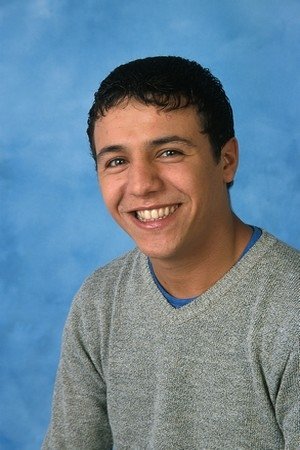

Faudel Belloua (Arabic: فُضيل بيلوى; born June 6, 1978) is a French raï singer and actor of Algerian descent. He released studio albums, notably Baïda, Samra, Un Autre Soleil and Mundial Corrida and the live album 1,2,3 Soleils jointly with Khaled and Rachid Taha. Born in Mantes-la-Jolie, a suburb of Paris, and raised by Algerian-born immigrant parents in the Val Fourré neighborhood, the young Faudel was introduced to Algerian raï by his grandmother who performed regularly in Oran with the meddahates, groups of female musicians who play traditional folk raï at weddings and other family occasions. It was Amaria, Faudel's grandmother, who was largely responsible for teaching him traditional raï rhythms during the summer holidays in Algeria. His first public singing experience was during a family wedding celebration in Oran, Algeria. Faudel started to cover the popular tracks by Cheb Khaled and Cheb Mami at 12, after which he soon fronted the popular band Les Etoiles du Raï (The Rai Stars). Faudel and Les Etoiles du Rai soon became a well-known fixture at the youth club and other local associations in Mantes-la-Jolie. Faudel then went on to appear at clubs throughout the Paris suburbs, performing covers of Khaled, Zahouania and Mami's greatest hits, accompanied by a pre-recorded backing tape. The turning-point of Faudel's early career came at the age of 13 when he was spotted at Printemps de Bourges by Mohamed Mestar (aka Momo). Mestar, an ex-guitarist, had recently set up an association in the suburbs to promote up-and-coming local artists and, after catching one of Faudel's concerts, he offered to take charge of the young Rai singer's career. Thanks to Momo's guiding hand, Faudel soon built up his own repertoire and began collaborating with different artists, and playing in a few Cheb Mami and MC Solaar concerts as well. Faudel went on to study accountancy and metallurgy, but his passion for Rai soon led to him taking up a professional singing career. Faudel's debut album, Baïda, was released in 1997. A year later, he was invited to sing with Khaled and Rachid Taha in the 1, 2, 3 Soleils concert in Paris. His collaboration with them made him a household name in France and Algeria. His other albums include Samra and his album Un Autre Soleil (released Sept. 2003) and, most recently, Mundial Corrida (2006). He also has acted in a few roles, including Happenstance (Le Battement d'ailes du papillon) with Audrey Tautou. Even though Faudel was still in his early teens, he managed to establish himself as the new voice of Rai. Indeed, in 1995 two French television documentaries were made about the rising young star from Mantes-la-Jolie - Saga cités (which was broadcast on the state-owned channel France 3) and Les Enfants du Rai (broadcast on the Franco-German channel Arte). The following year Faudel would be chosen to represent the Ile-de-France region at the prestigious Printemps de Bourges Festival. And the young singer's impressive performance in the New Talent category would only serve to increase his growing popularity. ... Source: Article "Faudel" from Wikipedia in English, licensed under CC-BY-SA 3.0.